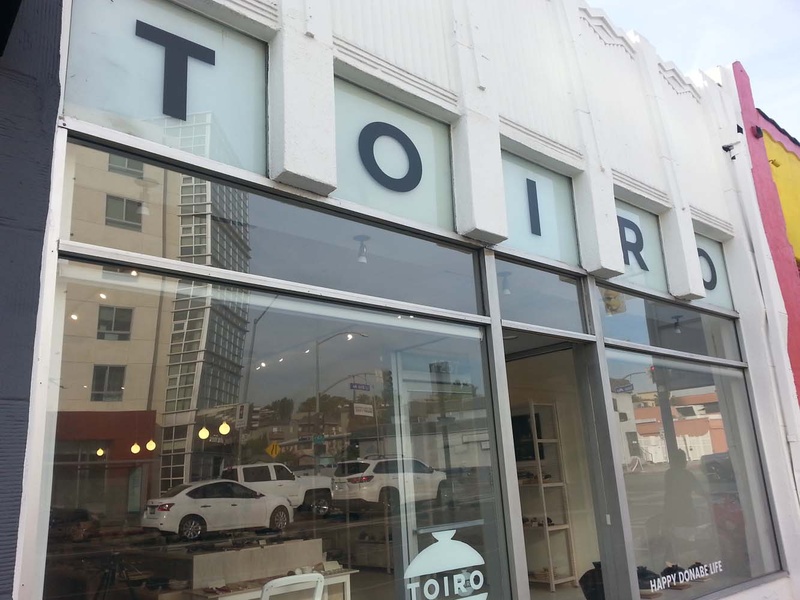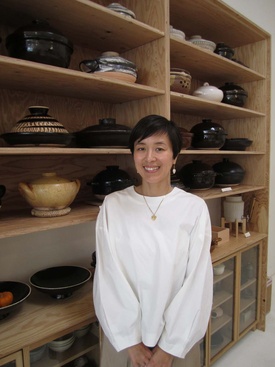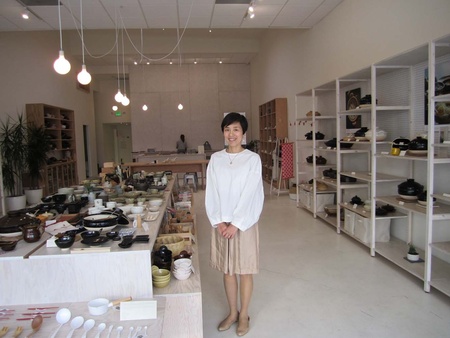To the mixed culture of Los Angeles
The clay pot shop is located along La Brea in West Hollywood. If you drive south from Hollywood, a large sign bearing the shop's name, "TOIRO," catches your eye. "We named the shop after the words 'toiro', which means 'ten people, ten colors,'" says Naoko Takei More, owner of TOIRO. When I first heard from an acquaintance that there was a clay pot specialty store in Los Angeles, I didn't quite understand what she meant at first. Can you make a business out of just clay pots? Are there that many different kinds of clay pots? Do Americans even know about clay pots? All of these questions were answered when I met Naoko herself. She was the person who "successfully brought clay pots into American life."
Naoko was born in Yokohama and grew up in Tokyo. She studied abroad in the US twice during her university years, and after graduating, she worked in the Japanese music industry. Although she found the glamorous world rewarding, she decided to leave her job and move to the US in 2001.
"I love food and wine, so I enrolled in Le Cordon Bleu in Pasadena (a town north of Los Angeles) with the goal of studying cooking for a year. Le Cordon Bleu is known for French cuisine, but I chose Los Angeles instead of Paris because I was attracted to the mixed culture that is unique to Los Angeles. I didn't have a firm plan of what I wanted to do a year later. I was still in my 20s at the time, so I just followed my heart and wanted to do what I wanted to do now."
The opportunity to stay in the US came quickly: she met and married her now-husband Jason Moore, who works in film and TV production, and was also approached by Cordon Bleu for a job.
"I was recruited as a full-time instructor for a wine program. I designed the wine program from scratch and taught there for two and a half years. But I began to feel that there was a limit to what I could do by teaching the same program over and over again, so I wanted to do something new and so I got a job at a film company."
Healthy cookware that represents Japanese food culture
At that time, she started holding cooking classes at her home using the clay pot she had always used. After she came across an Iga-yaki clay pot from Mie Prefecture, she wanted to introduce it to America, so she opened an online shop as a side business. The more she worked with clay pots, the more her passion grew, and 10 years ago she decided to focus her work solely on clay pots. She also published a recipe book, expanding her circle of fans.
Thus, after "running the online shop on my own while continuing to hold cooking classes at my home at the same time," she opened the street-front TOIRO in October 2017. In addition to Iga-yaki clay pots, the store also stocks Japanese seasonings and rice carefully selected by Naoko herself that go well with hot pot dishes.
When asked about the appeal of clay pots, she replied, "They are cooking utensils that represent Japanese food culture, and they can be used to prepare healthy meals. Not only can they be used for a variety of cooking methods, such as steaming and smoking, but if you eat rice cooked in a clay pot, you'll be amazed at how delicious it can be. Also, Americans seem to be particularly interested in the culture of eating around a pot." Naoko herself says that she is attracted to clay pots because of the feel of the earth when she touches them. "You can really feel that they come from the earth, and that's true for humans too. The sense of closeness is what's appealing about them more than anything."
Expanding the clay pot community from our stores
Apparently, they received 1,000 orders in December 2017. Some people buy several at once. Prices range from affordable items under $100 to luxury items at $850.
Customers also come from all over the United States and even overseas. "We get a lot of orders from the East Coast, and for some reason from Minnesota, maybe because it's cold there. When asked how they find our store, they search for 'vegetarian recipes' and end up in my recipe book."
She also continues to hold cooking classes. The number of participants is limited to 10 people per class, and when she recruits, the classes sell out within an hour. "I think that those who want to try clay pot cooking should feel free to incorporate the good points of clay pot cooking into their own way. I just act as a bridge between the two."
There are many popular recipes, including salmon with hijiki rice. "Chicken hotpot, tantan hotpot, and curry yakisoba made in a tajine-style clay pot are also delicious. There are many different kinds." As there are many different recipes, the students who come to the cooking class are also very diverse. "Sometimes Japanese people participate, but Americans of all ages and backgrounds, both men and women, come to learn."
Finally, we asked Naoko, who has been living in the US for 17 years and is promoting traditional Japanese lifestyles to American society, about her identity. "I don't take up (American) citizenship. I'm a small person myself, but I feel like I'm representing Japan, no matter how small. I want to continue promoting the good things of Japan." She talks about her ambition to use her store as a venue to invite instructors from Japan and hold workshops and demonstrations related to clay pots. After her time as a wine instructor, Naoko moved on to the next career, saying, "I want to do something new!" but it seems there's no end to her work of promoting food culture through clay pots.
© 2018 Keiko Fukuda








